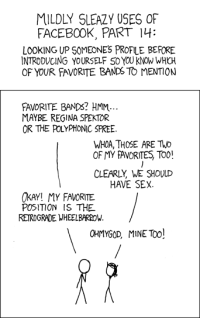Subconscious stalking?
post by KatjaGrace · 2009-09-06T09:00:43.000Z · LW · GW · 0 commentsContents
No comments
Just seeing another person look at something can tend to make you like it a bit more than if you see them looking in another direction:
In this study, we found that objects that are looked at by other people are liked more than objects that do not receive the attention of other people (Experiment 1). This suggests that observing averted gaze can have an impact on the affective appraisals of objects in the environment. This liking effect was absent when an arrow was used to cue attention (Experiment 2). This underlines the importance of other people’s interactions with objects for generating our own impressions of such stimuli in the world.
The authors suggest this is because people really do tend to look at things more if they like them, and that another person likes something is information about its value. This makes sense, and even more if we assume that the ancestral environment contained fewer eye catching people paid to prominently give items their attention.

Is observing the eye movement of others a precursor to facebook? (picture: xkcd.com)
Another possibility though is that people want to have coinciding tastes to those around them often, so we are not so much interested in clues to the item’s inherent value, but directly in the other person’s values. In that case if we evolved nicely we would react more to some people looking than to others.
Sure enough, this study found that such an effect seems to hold for attractive people, but not unattractive:
In a conditioning paradigm, novel objects were associated with either attractive or unattractive female faces, either displaying direct or averted gaze. An affective priming task showed more positive automatic evaluations of objects that were paired with attractive faces with direct gaze than attractive faces with averted gaze and unattractive faces, irrespective of gaze direction. Participants’ self-reported desire for the objects matched the affective priming data.
Added: These days we can discover (and adapt to) many people’s likes and dislikes prior to meeting them extensively, as long as they post them all over Facebook or the like. If the tendency to coordinate our values based on minor cues was good enough to evolve, does the possibility of doing so much more effectively via online stalking give a selective advantage to those who use it?
0 comments
Comments sorted by top scores.